Celebrating women transforming aquaculture in Bangladesh
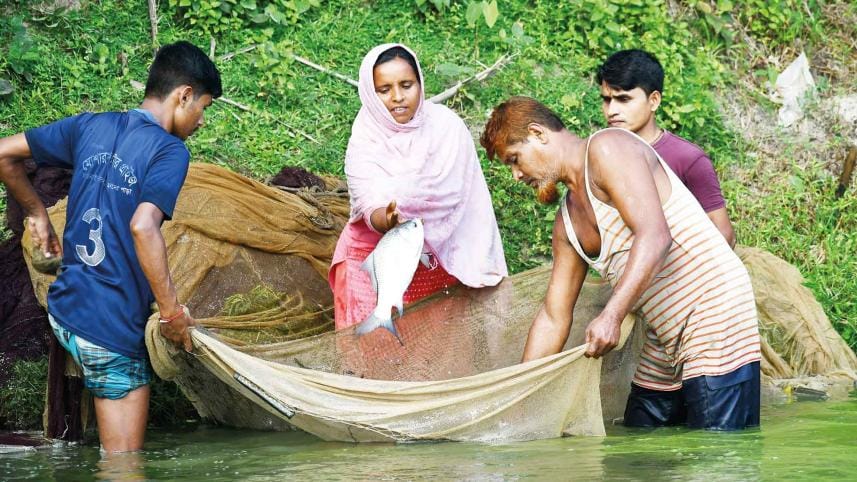
Today is the International Day of Rural Women, which offers us an opportunity to highlight the contributions of women and girls towards our rural development and aquaculture. On this occasion, The Daily Star, in partnership with WorldFish, is celebrating the achievements of six women fish farmers who have been working as local service providers (LSPs) in four northern districts of Bangladesh: Rangpur, Naogaon, Bogura and Gaibandha. The LSP model has been implemented under WorldFish's Aquaculture: Increasing Income, Diversifying Diets, and Empowering Women (IDEA) Project.

Romisa Khatun, Bogura
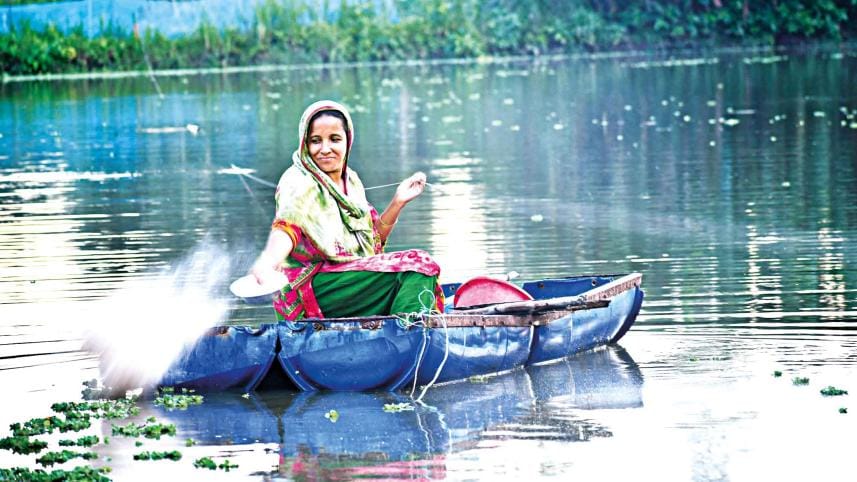
"Ten years ago, when I started farming fish in a small pond taken on lease, villagers used to criticise me saying that how can a woman be a fish farmer. They discouraged me from joining a 'man's profession'," said Romisa Khatun of Kapura Purbapara village under Bogura's Sherpur upazila.
Currently, she is farming fish in ponds on more than 22 bighas of land.
"I am now a full-time fish farmer," she added.
Romisa and her husband now make an annual profit of Tk 6 lakhs from the business, and recently purchased another 5 bighas of land worth Tk 60-70 lakh with their earnings.
For her success, Romisa received the "Best Aquaculture Farmers" award from the Department of Fisheries this year.
In 2021, Romisa was selected as a Local Service Provider (LSP) under WorldFish's IDEA project. She then underwent a four-day training on modern techniques of fish farming.
"I learned about various aspects of pond fish farming, such as how to grow zooplankton (fish feed), how and when to use lime, and how to detect fish disease and take remedy measures," she said.
Besides operating her fish farm, Romisa is now providing training and advice to local women involved in aquaculture. One such beneficiary is Farzana Begum, who has been farming fish in her two-bigha pond for the last 10 years.
"Earlier, I was not aware of modern ways of fish farming but I learnt a lot about it from Romisa. Now, I make a profit of more than Tk 70,000 annually," Farzana said.
Report and photo: Mostafa Shabuj
Amina Khatun, Bogura
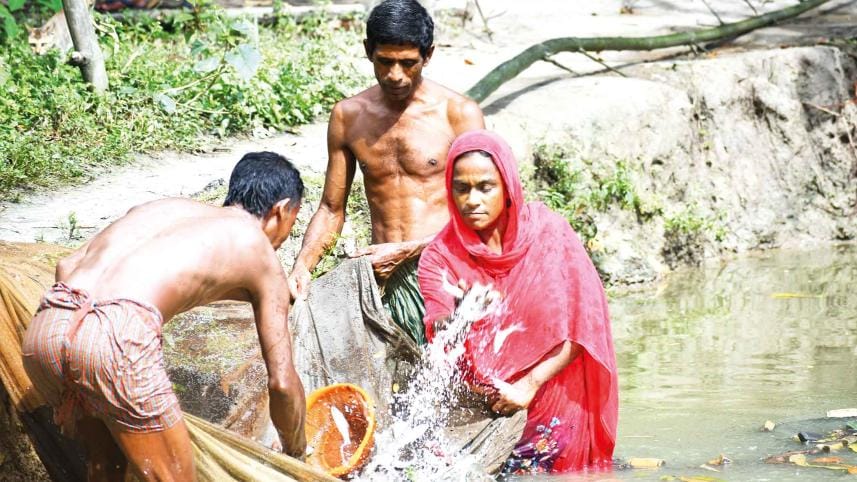
Amina Khatun graduated from a local college in Bogura in 2005 and then went to Dhaka to get a job and support her family but could not earn much from tutoring in a kindergarten school.
Amina returned home in 2010 and started farming fish in a 20-decimal pond. After that, she started earning a profit of Tk 50,000 annually by selling fish fry. Now, Amina cultivates fish in five ponds and makes a profit of more than Tk 2.5 lakh per year.
Amina was selected as an LSP and received training under the IDEA project, and now works as an LSP in her locality.
"I have learned so many things in the LSP training. Now, I know how to preserve the pond bank, how to stock the fry and fingerling, and how to cultivate vegetables on the pond bank," she said, adding that she has already trained 10 male and 15 female entrepreneurs on the business.
Samim Hossain, a local fish farmer, said he started farming fish when he was young but could not make much profit until he learned modern aquaculture techniques from Amina.
This year, Amina received the "Best Aquaculture Farmers" award from the Department of Fisheries on the occasion of National Fish Week.
Report and photo: Mostafa Shabuj
Nazmina Begum, Naogaon
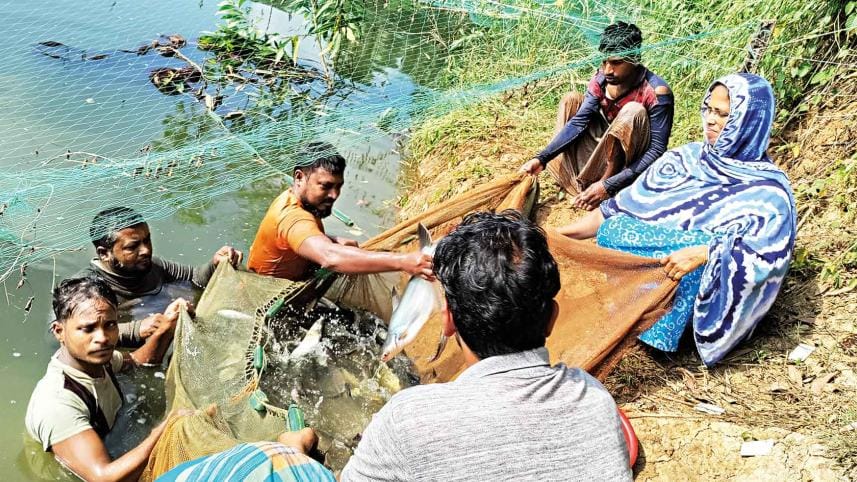
"I was at a loss after the death of my husband in 2012 as I had two young children to raise," said Nazmina Begum from Kasba village of Naogaon's Barshail union.
"Our family used to cultivate paddy on our 165-decimal plot but it was quite impossible for me to look after that. So, I opted for fish farming," added Nazmina, who won the "Best Aquaculture Farmers" award from the Department of Fisheries this year.
Nazmina started farming fish in 2014 in her family pond. She used to take advice from local fish farmers to improve her production but could not attain much success.
In 2021, she was selected as an LSP under the IDEA project and received a four-day training on fish farming management practices and nutrition. In addition, she was taught about gender equality.
The programme also taught her how to increase profits by farming in an integrated manner, secure loans, and market fish.
Nazmina then expanded her farming activities and even planted banana and mango trees around the ponds that were once unused.
"Now, I produce high-quality carp fry by hatching eggs. Keeping some for myself, I sell them to other farmers," she said.
Local fish farmer Chanchol Ali informed that many farmers like him are getting quality carps and learning marketing policies from Nazmina.
Report and photo: Bulbul Ahmed
Fenci Akter, Naogaon
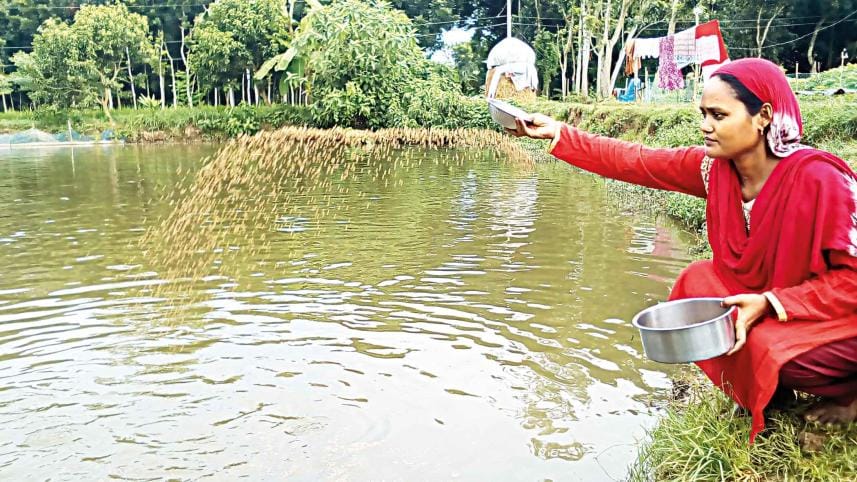
"I started fish farming in 2014 to improve the income status of my family. I used to take advice from local fish farmers but didn't get much success. However, I didn't leave it," said Fenci Akter, a fish farmer from Barshail village of Naogaon Sadar upzila.
In 2021, Fenci participated in a four-day training programme under the IDEA project and became an LSP.
"I learnt about integrated fish farming methods, accessing loans from banks and the marketing process of fish produce," added Fenci, who was also taught about nutrition and gender issues through the training programme.
Fenci then said she initially only used to cultivate breeds of carp but now raises various small species as well.
"I am making good profit from my small investment," she said.
Fenci is now leading a team of 25 women and spreading her knowledge among local fish farmers. Other than imparting knowledge about modern fish farming techniques, she also informs people about how to ensure proper nutrition.
Kohinur Begum, a fish farmer of the same area, said she used to farm fishes in a one-bigha pond to meet her family demands. Inspired by the success of Fenci, she is now cultivating fish commercially and making good profit.
Fenci taught her how to cultivate healthy fry, what types of food and medicines should be used, and how to market fish produce.
Report and photo: Bulbul Ahmed
Shilpi Begum, Gaibandha

Sompa Akter, who is currently doing her masters in economics at Rangpur Carmichael College, is a young fish farmer.
Sompa, a resident of Monohorpur village in Gaibandha, started fish farming one year ago after failing to secure a job following her undergraduate degree.
Sompa said she got training on fish farming from a neighbouring woman named Shilpi Begum and now earns around Tk 50,000 annually from her just 30-decimal pond.
Shilpi started fish farming around five years ago in a small pond without getting any training.
Later in 2020, she received four days of training. Now, she cultivates fish in five ponds and makes a profit of more than Tk 2 lakh each year.
"I learned so many things from the LSP training. It increased my skill on how to prepare the pond before farming fish, how to select the proper fry, how to stock it, and how to rear the fish properly," Shilpi said.
"As I am working as a LSP, I provide training to women entrepreneurs who are interested in fish farming. I have also disseminated information on gender equality and nutrition," she added.
This year, Shilpi received the "Best Aquaculture Farmers" award from the Department of Fisheries for her outstanding contribution.
Report and photo: Mostafa Shabuj
Ambia Begum, Rangpur
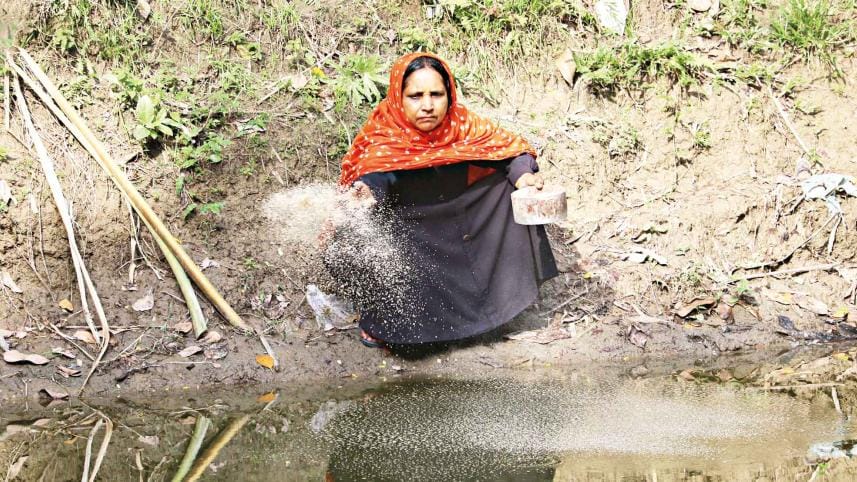
In rural areas, there is a common perception that large water hyacinths are a good source of fish feed, but that is not true.
"Only small size water hyacinths are suitable for fishes," said Ambia Begum, a fish farmer from Khord-Bhutchhara village under Rangpur's Kaunia upazila. She has been helping local fish farmers improve their fish production by teaching them modern farming techniques.
Ambia went on to say that she always wanted to be a fish farmer and finally in 2016, she was able to start her farm in a 25-decimal pond.
However, she initially failed to make much progress due to a lack of knowledge on aquaculture.
"But in 2021, I was selected as an LSP, and it was a game-changer for me," Ambia said.
"I learnt about various aspects of fish farming, including fish feed, aquaculture product use and product safety. We also got some training on financial management and marketing our produce." she added.
Ambia, who received a "Best Aquaculture Farmers" award from the Department of Fisheries this year, is now leading a team comprising 64 members and spreading her knowledge of modern fish farming among local farmers and also sells fish feed.
Report and photo: Kongkon Karmaker




 For all latest news, follow The Daily Star's Google News channel.
For all latest news, follow The Daily Star's Google News channel.
Comments